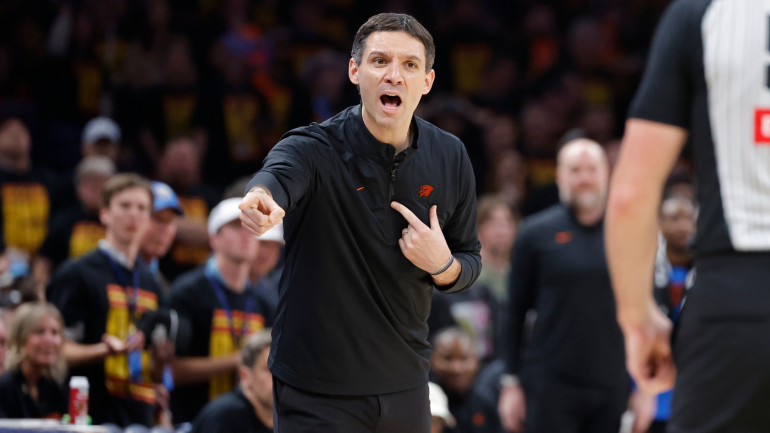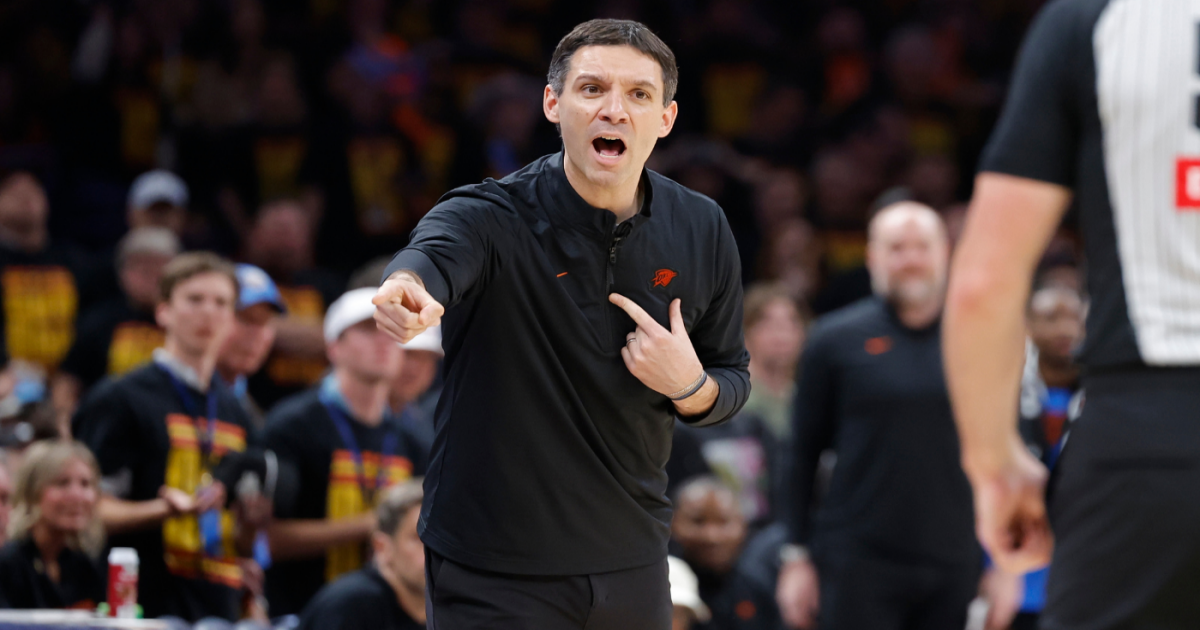
Imagn Images
Shai Gilgeous-Alexander did two things when he sank two free throws with 13.2 seconds remaining in Game 1 between his Oklahoma City Thunder and the Denver Nuggets. First, and most importantly in the moment, he gave the Thunder a 117-114 lead. Second, and ultimately more importantly, he gave his head coach, Mark Daigneault, the most important decision of his season to date.
The Nuggets needed a 3-pointer to tie the game. The Nuggets also happen to attempt the fewest 3-pointers in the NBA. The Thunder, meanwhile, not only had the NBA’s best defense in the regular season, but allowed their opponents to make only 34.2% of their 3-pointers for the season, which was the lowest mark in the NBA. If the best 3-point defense in basketball could just prevent the the least eager group of shooters in the NBA from making a single 3-pointer with less than 15 seconds on the clock, they would take a 1-0 series lead.
Daigneault, apparently, did not like those odds enough to give Denver the chance. Rather than allow the Nuggets to try to get a 3-pointer up, he decided to foul. The following, nearly unbelievable sequence of events occurred.
- With 12.2 seconds remaining, Alex Caruso fouled Nikola Jokić. He made both free-throws, making the score 117-116 Thunder. Timeout Thunder
- With 11 seconds remaining, Gilgeous-Alexander broke away from Denver’s defense for an easy dunk off an after-timeout inbounds play. This gives the Thunder a 119-116 lead.
- With 10.1 seconds remaining, Caruso fouled Aaron Gordon. This is especially significant for two reasons. The first is that Jokić had been removed from the game prior to Gilgeous-Alexander’s dunk because he had five fouls. The Nuggets couldn’t risk him picking up a sixth intentionally fouling a member of the Thunder on the previous play. However, the Nuggets did not have a timeout. They were expecting to put Jokić back on the floor during Oklahoma City’s free throws, but because Gilgeous-Alexander dunked rather than get fouled, they had no way of getting him back on the floor. Therefore, had the Thunder not fouled, Denver would have had 10 seconds to try to generate a 3-pointer without Jokić to orchestrate the possession. Instead, Jokić returned to the floor, and Gordon made both of his free throws. This cut the Thunder lead down to 119-118.
- With 9.1 seconds remaining, Russell Westbrook fouled Chet Holmgren. Holmgren missed both free throws. Now, the Nuggets no longer need a 3-pointer. Christian Braun hits Russell Westbrook past mid-court. Fearing a transition layup or a drive that might yield free throws, both Holmgren and Jalen Williams, the two Thunder defenders who were really in the play, kept their eyes on him. But Westbrook passed the ball to Gordon, who drilled a game-winning 3-pointer with 2.8 seconds remaining.
Obviously, there’s a lot to unpack here. As Daigneault pointed out, fouling up three is not new for the Thunder. It’s the strategy they’ve used all year, and they executed it per their coach’s orders, and he took the blame after Game 1. “It’s tough to switch the strategy,” Daigneault said. “We’ve got the guys locked in on fouling up three as a philosophy. They executed it like I said.”
Broadly speaking, fouling up three is probably the right strategy. It’s hard to pin down specific data supporting that because every game scenario is different, but there’s a common sense to this: if your opponent needs three points and there’s a strategy available that grants them only two one-point shots, that’s usually going to be the proper play.
If Holmgren, a 78% free-throw shooter for his career, makes both of his last two attempts and Denver has to deal with that three-point lead without a timeout, we’d likely be having a very different conversation right now. Before you argue that the Thunder shouldn’t have counted on Holmgren to make his shots, remember that Gordon is a 69.3% free-throw shooter for his career. Part of this was execution, not strategy. The Nuggets made their free throws and the Thunder didn’t.
As always, though, there is important context to consider. The biggest on Monday was the clock. With only a few seconds remaining, a foul is the obvious play. Even if your opponent makes both free throws, they wouldn’t have enough time with only, say, two or three seconds remaining to get the ball back and make another shot of their own. But Oklahoma City’s fouling started with 13.2 seconds left, more than enough time for follow-up possessions.
Their two intentional fouls came only 2.1 seconds apart from one another, both with more than 10 seconds remaining on the game clock. This turned a game that could have concluded in a single possession into one that featured five possessions in the final 13.2 seconds. More possessions means more variance. Variance favors the trailing team and the underdog. The Nuggets were both on Monday. Even if Holmgren had made both of his free throws, there was still so much time on the clock that the Thunder would have had to have fouled Denver at least one more time, if not two, to seal the game this way. That’s a lot of opportunities for something weird to break Denver’s way.
Even if they’d wanted to play this way, adaptability is probably the single most important trait a coach can have. Daigneault, frankly, had tunnel vision. He didn’t adjust when circumstances gave him a possible final offensive possession for Denver that did not include Jokić. During the regular season, the Nuggets made 39.6% of their 3-pointers with Jokić on the floor… and 34% when he was off of it. That was probably the single biggest mistake of the sequence.
But even if you look at the final 13.2 seconds holistically, it’s worth wondering if Daigneault’s fear of a possible 3-pointer was even justified. Consider the context of the game itself:
- Denver shot 31.3% from deep in Game 1. Gordon’s winner aside, it’s not as though the Nuggets had a particularly hot hand in Game 1.
- Even if the Thunder were dead set against fouling… it’s not as though the Nuggets would have known that. Denver would have had to operate offensively as though the possibility of a foul existed. That would mean rushing up the first semi-plausible 3-pointer it could get, whether or not it was especially open or in the hands of the right shooter. In other words, if they got a 3 under these circumstances, it was probably going to be a bad 3.
- There were 13.2 seconds left when the intentional fouling began. It’s hard to believe the Nuggets could have methodically whittled all of that time off of the clock when operating from such a desperate position. If you believe they were taking the first 3-pointer they could find, it likely would have come with five or six seconds left on the clock. Therefore, even if it goes in, the Thunder could have called timeout and drawn up their own attempt at game-winner on the other end of the floor. They have the presumptive MVP in Gilgeous-Alexander. They could have felt reasonably good about their chances of scoring on that hypothetical last possession.
- Let’s say the game goes to overtime. The Nuggets just played a Game 7 against the Clippers two days ago. The Thunder swept their first-round series against the Clippers and were therefore far more rested. Meanwhile, six players played at least 40 minutes in this game. Jamal Murray (44) and Jokić (42) led the game. Braun and Gilgeous-Alexander were at 40. Gordon and Williams played 39. The Thunder were fresher within the game itself as well, and given their depth, could have cycled in whichever reasonably fresh reserve they needed whereas Denver has proven all postseason that it basically only trusts the starters and Westbrook. As a cherry on top, the Thunder were also playing at home. The odds, even if the game went to overtime, were overwhelmingly in their favor.
Measuring all of these variables on the fly is part of what makes coaching such a difficult job, and ironically, one could argue that Daigneault has almost done that job too well this season. The Thunder just had the second-best net rating in NBA history. They blew everyone out. In the entire regular season, they played only 24 clutch games. No other team played fewer than 29. That inexperience was obviously felt as the players blew a double-digit fourth-quarter lead, but it also seemingly came up for Daigneault in those final moments. This is only his second postseason. He’s had far fewer regular-season reps in situations like this. So he played the odds rather than evaluating the entirety of the game context. That may be a valuable learning experience for him down the line, but for now, it may have cost the Thunder Game 1.
